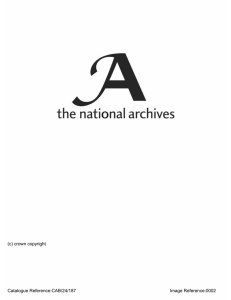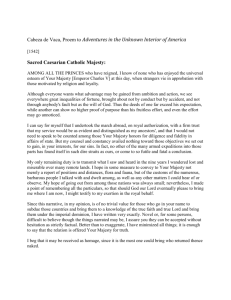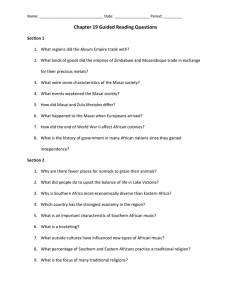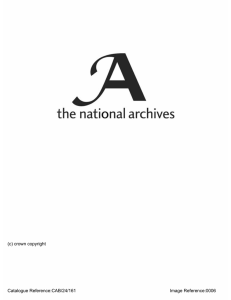(c) crown copyright Catalogue Reference:CAB/24/187 Image Reference:0004
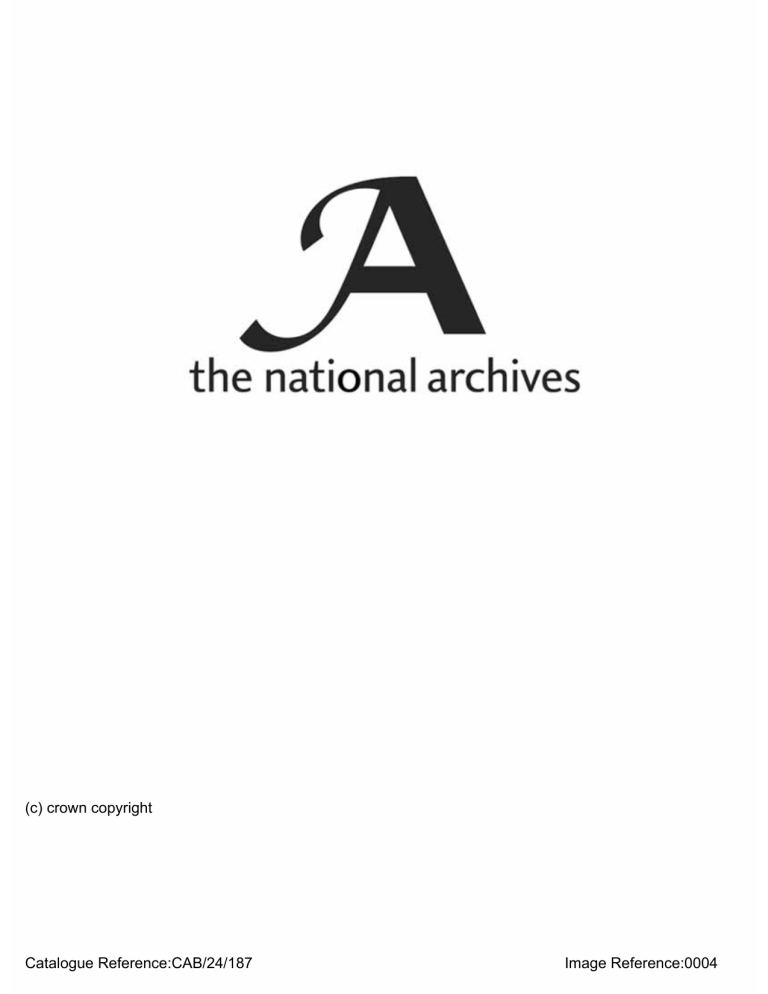
(c) crown copyright
Catalogue Reference:CAB/24/187 Image Reference:0004
[This Document is the Property of Hit Britannic Majesty's Government.] J fj g
Printed for the Cabinet. July
1927.
C O N F I D E N T I A L .
C P . 192 (27).
Copy N o .
3 0
C A B I N E T .
F U T U R E P O L I C Y I N R E G A R D T O E A S T E R N A F R I C A .
D W P
(Circulated by the Secretary of State for the Colonies.)
T HE presence in this country of several Governors and other senior officials from the East African Dependencies has provided an opportunity for the discussion of the question of future policy in regard to Eastern Africa. During the last few years policy as regards the East African Dependencies has been largely governed by the statement issued by His Majesty's Government in 1923
(Cnid. 1922), which, while primarily designed to deal with this specific question of Indians in Kenya, dealt also, in no small degree, with East African policy as a whole.
The following is an extract from this s t a t e m e n t : —
" Primarily, Kenya is an African territory, and His Majesty's Govern ment think it necessary definitely to record their considered opinion that the interests of the African natives must be paramount, and that if, and when, those interests and the interests of the immigrant races should conflict, the former should prevail. Obviously the interests of the other communities, European, Indian or Arab, must severally be safeguarded. Whatever the circumstances in which members of these communities have entered Kenya, there will be no drastic action or reversal of measures already introduced, such as may have been contemplated in some quarters, the result of which might be to destroy or impair the existing interests of those who have already settled in
Kenya. But in the administration of Kenya His Majesty's Government regard themselves as exercising a trust on behalf of the African popula tion, and they are unable to delegate or share this trust, the object of which may be defined as the protection and advancement of the native races. It is not necessary to attempt to elaborate this position; the lines of development are as yet in certain directions undetermined, and many difficult problems arise which require time for their solution.
But there can be no room for doubt that it is the mission of Great
Britain to work continuously for the training and education of the
Africans towards a higher intellectual, moral and economic level than that which they had reached when the Crown assumed the responsibility for the administration of this territory. At present special consideration is being given to economic development in the native reserves, and within the limits imposed by tho finances of the Colony all that is possible for the advancement and development of the Africans, both inside and outside the native reserves, will be done.
His Majesty's Government desire also to record that in their opinion the annexation of the East Africa Protectorate, which, with tho exception of the mainland dominions of the Sultan of Zanzibar, has thus become a
Colony, known as Kenya Colony, in no way derogates from this fundamental conception of the duty of the Government to the native races. As in the Uganda Protectorate, so in the Kenya Colony, the principle of trusteeship for the natives, no less than in the mandated territory of Tanganyika, is unassailable. This paramount duty of trusteeship will continue, as in the past, to be carried out under the
Secretary of State for the Colonies by the agents of the Imperial
Government, and by them alone.
2. Future Constitutional Evolution.
Before dealing with the practical points at issue directly oonneoted with tho claims of Indians, it is necessary, in view of the declaration of policy enunoiated above, to refer to the question of the future constitutional evolution of Kenya.
[16861] B
It has been suggested that it might be possible for Kenya to advance in the near future on the lines of responsible self-government, subject to the reservation of native affairs. There are, however, in the opinion of Ifis Majesty's Government, objections to the adoption in Kenya at this stage of such an arrangement, whether it takes the form of removing all matters affecting Africans from consideration in the Council, or the appointment of the Governor as High Commissioner for Native Affairs, or provision for a special veto by the Crown on local legislation which touches native interests; and they are convinced that the existing system of government is, in present circumstances, best calculated to achieve the aims which they have in view, namely, the unfettered exercise of their trusteeship for the native races and the satisfaction of the legitimate aspirations of other communities resident in the Colony.
His Majesty's Government cannot but regard the grant of responsible self-government as out of the question within any period of time which need now he taken into consideration. Nor, indeed, would they con template yet the possibility of substituting an unofficial majority in the
Council for the Government official majority. Hasty action is to be strongly deprecated, and it will be necessary to see how matters develop, especially in regard to African representation, before proposals for so fundamental a change in the Constitution of the Colony can be entertained. Meanwhile, the administration of the Colony will follow the British traditions and principles which have been successful in other
Colonies, and progress towards self-government must be left to take the lines which the passage of time and the growth of experience may indicate as being best for the country."
Although only four years have passed since this document was issued by H i s Majesty's Government, various developments have taken place. First of all came the visit of the East Africa
Commission in 19*24, and the report of that Commission focused public attention, both in this country and in East Africa, on the common needs and problems of the Dependencies. The report brings out the fundamental fact that the East African territories are differentiated in character from West Africa, on the one hand, and South Africa on the other, because in each and all of the territories on the East African mainland, while the native popula tion will always, as far as can be foreseen, vastly outnumber the immigrant races, European settlement—particularly in the highland areas, over 4,000 feet in altitude—has been taking place in varying degrees, with the result that, while the greater part of the area must necessarily be regarded as native, and its agricultural development must be effected by the native inhabitants, there are other areas, sparsely inhabited, where European planters and settlers are affording the main stimulus in the economic progress of the territories.
Following the Report of the East Africa Commission there took place early in 1926, in Nairobi, a Conference of the Governors of the British East African Dependencies. I n the Report of this
Conference the following observations were made on the subject of the " d u a l p o l i c y , " i.e., the complementary development of non-native and native production : —
" If the whole country were to be handed over to a policy of native production alone under the guidance of European administration, it would have to be constituted an economic sanctuary so as to prevent the economic needs of the outside world from forcing some other form of development upon it. For these reasons East Africa has already been committed to what is known as the dual policy—that is, to a combination of non-native and native production.
The dual policy, however, raises considerable problems of its own.
On the one hand, there is the obligation which rests on every civilised
Government of raising the capacities of its human subjects to their fullest expression; on the other, there is the equally imperative duty of developing to the utmost the productive power of its possessions. This latter duty cannot be performed under any system whioh sacrifices the native human being to foreign exploitation of the soil. It is not possible to allocate to each area the quota of human labour required for complete commercial success. The whole problem is to arrive at a just and far-seeing method of harmonising the best progress and welfare of the native inhabitants with the maximum of production."
This Conference was the first step taken towards securing better co-operation between the administrations of territories whose boundaries are in the main the result of historical accident rather than the expression of ethnological and geographical facts..
The announcement of the holding of the Governors' Conference started a new movement on the part of the European settlers
towards closer contact, and two unofficial conferences have been held within the last two years, at Tukuyu in Tanganyika and
Livingstone in Northern Rhodesia respectively, which were attended by leading settlers from the various Dependencies. The desirability of federation also figured in the programme of nearly all the candidates at the recent election for the Legislative Council in Kenya. The business communities in this country who are concerned in East Africa have also, through the Joint East African
Board and otherwise, indicated their interest in closer union.
Other recent developments also point to the necessity for some closer union between the Administrations, (a.) The authority given by the East Africa Guaranteed Loan Act for loans amounting to
£"10,000,000 to be guaranteed by His Majesty's Government for the purpose of development in East Africa necessitates the proper co-ordination of policy in regard to railways and other transport facilities for the country as a whole, rather than the pursuit of the narrower aims of each particular territory. The construction of new lines is already bringing railway and port systems into competition with each other.
(b.) There is a general movement in favour of effective co-operation between all the territories as regards research services. The Agricultural Institute at Amani in Tanganyika
Territory is being reopened by means of contributions from each of the Governments. All the East African Governments have contributed towards the expenses of the Sleeping Sickness Commis sion recently sent out by the League of Nations to Entebbe in
Uganda, and it is proposed that the necessary measures to continue the work of this Commission shall be financed mainly from the joint resources of the British East African Dependencies. Similarly, the problems of Veterinary research are to be dealt with on a common basis, and it has been suggested that the Veterinary research interests of all the Territories shall be centralised at Kabete in Kenya. (c.) Again, there are actually in existence identic
Customs Tariffs in Kenya, Uganda and Tanganyika, with actual
Customs and postal union between Kenya and Uganda, but difficulty is experienced in establishing a complete Customs union and in preserving uniformity in Customs administration. .
The growth of European and other settlements in the East
African dependencies raises the problem of the part which these communities must play in the political as well as the economic life of the several territories. Their claim to share progressively in the responsibilities of government cannot be ignored. These responsi bilities, however, cannot be limited to the representation of their own community interests; and if clashes between these interests and those of the vast native populations are to be avoided, their share in the trusteeship for the progress and welfare of the natives must be developed.
Quite apart from this necessity, the dual policy in regard to economic development should have its counterpart in the political evolution of the territories. Every year we are providing more educational facilities for the natives, and although in some places it rnay be many years before the native can take a direct part in the central Legislatures, his place in the body politic must be provided for, and steps taken to create the machinery whereby native self government, at first quite local, and later over larger areas, can be developed.
These considerations point in two principal directions. First, an investigation as to how closer union and co-operation between the
Territories may be most effectively secured, and, secondly, whether it is possible to provide for increasing association of the immigrant communities in the responsibilities of government, and at the same time for the creation of more effective machinery for native representation.
It may be found that it is necessary to proceed in these matters by successive stages. While the ultimate possibility of federation of all the six Territories concerned should be borne in mind, closer union may prove on examination to be practicable in the first instance only between Kenya, Uganda and Tanganyika, leaving it open to Zanzibar, Nyasaland and Northern Rhodesia to come into any new structure as' and when the development of communications permits.
1
[16361]
B 2
Article 10 of the Mandate for Tanyanyika authorises the manda tory Power '' to constitute the territory into a customs, fiscal and administrative union or federation with the adjacent territories under his own sovereignty or control, provided always that the measures adopted to that end do not infringe the provisions of this
Mandate."
. In the event of investigations proving that some, at any rate, of the East African territories are ripe for the creation of a federal
Constitution, consequential changes may be required in the powers and composition of the existing Legislatures. In any such changes it will be essential to declare that the administration of the East and
Central African territories is still regarded by His Majesty's Govern nient as the exercise of a trust on behalf of the African population, and that, while they may now be prepared to associate with them selves in that trust the members of the resident immigrant communities, they will still ensure that the principles of this trusteeship will be observed.
The responsibilities of His Majesty's Government for the terri torios of Eastern and Central Africa, with their 12-'- millions of inhabitants, are of the very gravest character, and the possibilities of advantage to the Empire from the proper development of these areas are almost incalculable. On the other hand, the possibilities of disaster through the failure to guide that development aright are no less plainly discernible, and it is clearly wise that no time should be lost in deciding the course which our policy must pursue, if the highest interests of all concerned, of whatever race, are to be secured. At the same time, it will be a fatal error if any decisive step is taken before we have satisfied ourselves that such a step will be received with good will by those whose co-operation will be necessary for its success. Financial considerations cannot be ignored, and before communities in East Africa can fairly be asked to express opinions on so far-reaching a matter, the cost of any schemes must be estimated.
It is therefore clear that before His Majesty's Government can formulate any final decisions upon these subjects a further Commis sion of Enquiry must be 6ent out to East and Central Africa. His
Majesty's Government accordingly make the following announcement:—
His Majesty's Government consider as a result of discussions between the Secretary of State for the Colonies and the Eepresenta tives of the territories in British Central and East Africa who attended the recent Colonial Conference, that some form of closer union between the territories of Central and Eastern Africa appears desirable, more particularly in regard to the development of transport and communications, customs tariffs and customs admini stration, scientific research and defence. They have therefore authorised the Secretary of State to send to Africa a special commission with the following terms of reference:—
1. To make recommendations as to whether, either by federation or some other form of closer union, more effective co-operation between the different Governments in Central and Eastern Africa may be secured, more particularly in regard to the development of transport and communica tions, customs tariffs and customs administration, scientific research and defence.
2. To consider which territories could either now or at some future time be brought within any such closer union, and, in particular, how best to give effect to Article 10 of the mandate for Tanganyika Territory, which provides that the mandatory may constitute the territory into a customs, fiscal and administrative union or federation with the adjacent territories under its own sovereignty or control, provided always that the measures adopted to that end do not infringe the provisions of the mandate^
8. To make recommendations in regard to possible changes in the powers and composition of the various Legislative
Councils of the several territories (a) as the result of the establishment of any Federal Council or other common authority; (b) so as to associate more closely in tho responsibilities and trusteeship of Government the
immigrant communities domiciled in the country; and
(c) so as ultimately to secure more direct representation of native interests in accordance with (4) below.
4. T o suggest how the Dual Policy recommended by the
Conference of East African Governors (i.e., the comple mentary development of native and non-native communities) can best be progressively applied in the political as well as the economic sphere.
5. To make recommendations as to what improvements may be required in internal communications between the various territories so as to facilitate the working of federation or closer union.
6. T o report more particularly on the financial aspects of any proposals which they may make under any of the above headings.
I n making the declaration of policy involved in setting up a
Commission with these terms of reference, His Majesty's Govern ment wish to make it clear that they adhere to the underlying principles of the White Paper of 1928 entitled " Indians in Kenya "
(Cmd. Paper, 1922), both in regard to the political status and other rights of British Indians resident in East Africa, and also as regards the Imperial duty of safeguarding the interests and progress of the native population as trustees for their welfare until such time as they can take part more fully in their own Government and in the common affairs of all races inhabiting the territories. At the same time they wish to place on record their view that, while these responsibilities of trusteeship must for some considerable time rest mainly on the agents of the Imperial Government, they desire to associate more closely in this high and honourable task those who, as colonists or residents, have identified their interests with the prosperity of the country.
July 1927.
